Pregnancy is a life-changing journey filled with anticipation, excitement, and sometimes uncertainty. While many symptoms are normal and expected, certain warning signs of pregnancy may indicate a problem requiring immediate medical attention. Being aware of these signs can help ensure a healthier pregnancy for both the mother and baby.
At Anandi Hospitals, we believe that knowledge is empowerment. In this blog, we’ll walk you through the common and serious pregnancy warning signs you should never ignore.
Understanding the Difference: Normal vs. Concerning Symptoms
Pregnancy comes with a wide range of physical and emotional changes. Some are completely normal, such as:
- Morning sickness
- Fatigue
- Food cravings or aversions
- Mild abdominal discomfort
However, certain symptoms may point to underlying complications. Early recognition and prompt action can be vital for the safety of the mother and baby.
Early Warning Signs in the First Trimester
The first trimester (weeks 1–12) is a critical stage in fetal development. Pay close attention to the following symptoms:
1. Severe Abdominal Pain or Cramping
Mild cramps are common, but intense or one-sided pain could indicate:
- Ectopic pregnancy
- Miscarriage
- Ovarian cyst complications
Consult your doctor immediately if the pain is sharp, persistent, or worsening.
2. Heavy Bleeding or Spotting
Light spotting can occur in early pregnancy, but heavy bleeding with clots may be a sign of:
- Miscarriage
- Implantation issues
- Cervical complications
Seek medical evaluation to rule out serious causes.
3. High Fever with Chills
A fever over 100.4°F (38°C) could suggest an infection, which can harm both you and the baby. Always seek prompt treatment for persistent fever during pregnancy.
4. Severe Nausea and Vomiting
Morning sickness is normal, but if you’re unable to keep food or water down for more than 24 hours, you may be experiencing hyperemesis gravidarum, a condition requiring treatment.
Mid-Pregnancy Red Flags (Second Trimester)
The second trimester (weeks 13–26) is often referred to as the “honeymoon phase” of pregnancy. However, complications can still arise. Be alert to these signs:
5. Sudden Weight Gain or Swelling
While gradual weight gain is expected, sudden swelling in the hands, feet, or face may be a sign of preeclampsia, a dangerous condition marked by high blood pressure.
6. Blurry Vision or Headaches
Frequent headaches, blurred vision, or seeing “spots” can also be symptoms of preeclampsia. This condition must be managed immediately to avoid severe complications.
7. Painful Urination or Blood in Urine
Urinary tract infections (UTIs) are more common during pregnancy. If left untreated, they can lead to kidney infections and preterm labor.

Critical Signs in the Third Trimester
As the due date approaches, the third trimester (weeks 27–40) brings its own set of warning signs:
8. Decreased Fetal Movement
You should feel regular movements from your baby by around 28 weeks. A noticeable reduction in kicks or activity may suggest distress and should be assessed by your doctor.
9. Persistent Back or Pelvic Pain
While back pain is common in pregnancy, intense or rhythmic lower back pain could signal early labor or placental issues.
10. Leaking Fluid from the Vagina
If you notice a sudden gush or steady trickle of fluid, it could mean your water has broken. If this happens before 37 weeks, it may indicate preterm labor.
General Pregnancy Red Flags to Never Ignore
Regardless of the trimester, the following symptoms should prompt an immediate call to your healthcare provider:
- Shortness of breath or chest pain
- Seizures or fainting spells
- Extreme fatigue or dizziness
- Signs of depression or anxiety
Mental health is just as important as physical health during pregnancy. If you feel overwhelmed, isolated, or anxious, don’t hesitate to seek support.
What To Do If You Experience a Warning Sign
If you notice any of the symptoms mentioned above:
- Stay calm. Not every symptom means something is seriously wrong.
- Contact your healthcare provider immediately to explain your symptoms.
- Go to the emergency room if the symptom is severe, sudden, or includes heavy bleeding, severe pain, or difficulty breathing.
Prevention and Early Detection Tips
While not all complications can be prevented, early prenatal care goes a long way in minimizing risks. Here are some helpful tips:
- Attend regular prenatal check-ups to monitor your baby’s growth and your health.
- Stay hydrated and eat a balanced diet rich in vitamins and minerals.
- Track your baby’s movements in the third trimester.
- Avoid smoking, alcohol, and unnecessary medications.
- Discuss any previous pregnancy complications with your doctor.
When to Seek Emergency Care
Call your doctor or visit the hospital immediately if you experience:
- Heavy vaginal bleeding
- Severe abdominal or pelvic pain
- High fever
- Convulsions or unconsciousness
- Sudden vision changes
- No fetal movement after 28 weeks
It’s always better to err on the side of caution when it comes to your health and your baby’s well-being.
Final Thoughts
Pregnancy is a beautiful, transformative experience, but it’s not without risks. Knowing what are the warning signs of pregnancy can make all the difference in early intervention and positive outcomes. Always listen to your body and trust your instincts.
At Anandi Hospitals, we’re here to guide you every step of the way — from the first positive test to your baby’s first cry. If you experience any concerning symptoms or just need reassurance, our expert team is just a call away.
